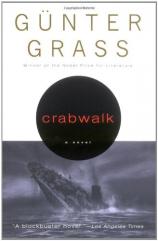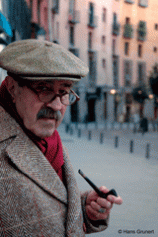Reading Group Guide
Discussion Questions
Crabwalk

1. Crabwalk is, first and foremost, an historical novel. Which parts of the history explored in this book were new to you? And which parts were familiar? On a personal note, did reading this book change how you think about or understand history? Explain why and how, if so.
2. Early in Chapter 1, we read of a group whom the narrator refers to as "the trio." Who are these people? What do they have to do with one another? And who is the narrator? How is he connected to "the trio"? Why is he telling us their stories?
3. The verb "to crabwalk" is employed metaphorically throughout the narrative. What does it mean in this book? Explain the title.
4. Discuss the key role played by fate or "the hand of Providence" in Crabwalk. How do each of the novel's three primary characters--Paul, Tulla, and Konny--regard the idea of destiny? As a group, explore the inevitability that permeates this novel.
5. Discuss the presence of Günter Grass himself in Crabwalk. In the opening paragraphs of Chapter 4, for instance, the author of this novel inserts himself as a minor character within the novel. Where else does he appear in these pages? And how is he linked to Paul, our narrator? What exactly is he asking Paul to do in this book--and why?
6. In Chapter 5, Paul claims, in a concluding aside: "So the numbers will forever remain uncertain. But what do numbers tell us? Numbers are never accurate. In the end you always have to guess." Identify the context of this remark. What is he saying here? And if we interpret his remark more generally, what is Paul saying about history and tragedy?
7. The catastrophe at the center of this book, the sinking of the German ship Wilhelm Gustloff by a Russian submarine in 1945, is approached from a variety of narrative angles and historical perspectives. In one such angle, midway through Chapter 5, Paul discusses a late-1950s film depicting the sinking of the Gustloff. He says: "Just as in all the Titanic films, a love story had to be brought in as filler, taking on heroic dimensions at the end, as if the sinking of an overcrowded ship weren't exciting, the thousands of deaths not tragic enough." But doesn't Crabwalk actually include such "filler" of its own? Discuss why you do or don't think so.
8. Compare and contrast the parent-child relationship of Tulla and Paul with that of Paul and Konny. To what degree, according to this novel, should parents be held accountable or responsible for the thoughts and deeds of their children? Cite relevant passages or scenes to support your views.
9. Memories, events, timelines, journalism, justice--so much of this novel concerns finding the facts, getting to the heart of the matter, searching for the truth, and so forth. But what questions raised by Crabwalk remained unanswered? If we were to examine this book as a mystery story, what would be its clues, motives, puzzles, and red herrings?
10. At the very end of the novel, we find that yet another "martyr" has been created. Who is it, and who are his adherents or followers? Finally, discuss the political, social, and historical implications of the book's final two sentences.
Crabwalk
- Publication Date: April 5, 2004
- Paperback: 252 pages
- Publisher: Mariner Books
- ISBN-10: 0156029707
- ISBN-13: 9780156029704







